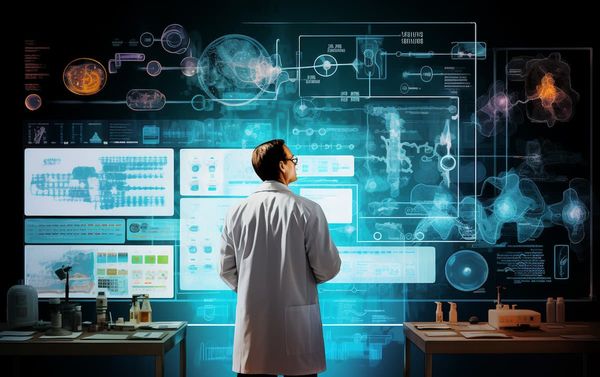In a world where artificial intelligence (AI) continues to make strides in various industries, the field of medicine is no exception. A recent study in Nature has demonstrated AI's superior accuracy in analyzing echocardiogram images, potentially transforming cardiac diagnostics and healthcare as we know it. This groundbreaking research unveils the promising role AI can play in improving patient care, saving time for medical professionals, and making healthcare more accessible for all.

The New Era of Cardiac Diagnostics
A groundbreaking study published in Nature reveals that artificial intelligence (AI) has surpassed human accuracy in analyzing echocardiogram images for diagnosing cardiac problems. Conducted by a multidisciplinary team at Cedars-Sinai Medical Center in Los Angeles, the study is the first of its kind to assess AI's precision in evaluating the heart's functioning using 3,495 echocardiogram images.
Blurring the Lines Between Man and Machine
In a randomized blind test, cardiologists were asked to assess evaluations made by either technicians or AI software. The doctors corrected errors in 16.8% of AI evaluations, compared to 27.2% of human evaluations. The cardiologists were unable to distinguish between AI-generated assessments and those made by human technicians.
Reduced Need for Cardiologist Intervention with AI Assistance
The study revealed that cardiologists were less likely to make significant changes to the LVEF assessment when assisted by AI technology. This result suggests that AI-guided assessments provide more accurate initial evaluations, reducing the need for cardiologists to intervene and make adjustments to the assessments.
Time-Saving Benefits of AI in Cardiology
AI-guided assessments took less time for cardiologists to review compared to traditional sonographer-guided assessments. With the increasing demand for medical professionals and the need for efficient diagnostic methods, AI technology offers a time-saving solution for evaluating cardiac function.
Consistency in AI-Assisted Evaluations
AI-assisted evaluations were found to be more consistent with previous clinical assessments made by cardiologists. This consistency could contribute to improved patient outcomes and streamlined medical workflows.
AI is a Valuable Tool, Not a Replacement
Despite AI's impressive performance, the research team, led by cardiologist David Ouyang, does not see AI replacing human professionals. Instead, they hope that AI can save specialists time and minimize tedious aspects of cardiac diagnosis work, with the cardiologist maintaining the final say.
A Growing Interest in AI Technologies
While there has been a surge of interest in AI technologies, few prospective trials have been conducted to evaluate their efficacy and impact on clinician assessments. This study showcases the potential of AI technology in improving diagnostic processes in cardiology.
Expanding AI's Role in Cardiac Prevention
Cedars-Sinai is also exploring AI's potential in other aspects of cardiac prevention. A team led by Sumeet Chugh has begun an observational study involving around 400,000 people to find a more precise way to evaluate the risk of ventricular fibrillation, a type of arrhythmia that can cause sudden death. The AI will be trained to detect patients with elevated cardiac failure risk who should undergo intervention.
External Validation of AI Models in Cardiology
This clinical trial utilized an AI model that was entirely trained from an independent site, representing external validation of the model. Effective deployment of AI models in cardiology clinical practice will require additional regulatory oversight, adoption by clinicians, and functional integration with clinical systems.
Future Applications of AI in Cardiology
The promising results of this study suggest that AI tools can improve both efficacy and efficiency in assessing cardiac function. Future steps could include studying the effect of AI guidance on cardiac function assessment across multiple centers, further enhancing the potential of AI technology in cardiology.
Making Medical Treatment More Accessible
Ouyang believes that AI technology can help make medical treatment more accessible. Although he does not rule out the possibility of AI eventually replacing human work, he emphasizes that cardiologists will still need to examine and verify AI-generated evaluations.
Balancing Risks and Benefits of AI in Medicine
Some practitioners are hesitant to entrust sensitive medical diagnoses to AI systems whose functioning is not entirely understood. However, experts like Regina Barzilai, who has developed algorithms that can improve cancer diagnosis, argue that the real danger lies in undervaluing and not utilizing AI technology that can enhance the precision of medical diagnoses. Barzilai believes that delaying AI's application to medicine could result in continued insufficient care, medical errors, and high healthcare costs.
Embracing the AI Revolution in Medicine: Implications and Challenges for Patients, Doctors, and Society
The recent advancements in artificial intelligence, particularly in the field of medical imaging and diagnostics, have opened up a new era for medicine. The ability of AI to surpass human expertise in analyzing cardiac diagnosis graphs and other medical data is a testament to the potential of this technology to revolutionize healthcare. As we stand on the cusp of this new era, it is crucial to consider the implications of AI integration in medicine for patients, doctors, and society as a whole.
As patients, the use of AI in medical diagnostics is likely to result in more accurate diagnoses and improved treatment plans. With AI's ability to quickly and accurately analyze vast amounts of data, patients can expect faster results and potentially life-saving early interventions. Additionally, AI can help bridge the gap between the limited availability of medical experts, particularly in remote or underserved areas, ensuring that everyone can access quality healthcare. In the long term, the use of AI in medicine could lead to a more personalized approach to treatment, as algorithms become more adept at identifying individual risk factors and tailoring treatment plans accordingly.
For doctors, the integration of AI in their practice will inevitably change the nature of their work. While it is unlikely that AI will completely replace human medical professionals, it will certainly streamline and improve many aspects of their job. By taking care of repetitive and time-consuming tasks, such as analyzing medical images or crunching large data sets, AI can free up doctors to focus on more complex and nuanced aspects of patient care. Additionally, AI can serve as a valuable decision-support tool, helping doctors make more informed decisions based on comprehensive data analysis. However, this shift also demands that medical professionals continuously update their skills and adapt to new technologies, ensuring that they can effectively collaborate with AI systems for the benefit of their patients.
The implications of AI integration in medicine are vast and complex for society as a whole. On one hand, the increased efficiency and accuracy brought by AI have the potential to significantly reduce healthcare costs and improve overall public health. This could, in turn, lead to a more equitable distribution of healthcare resources, benefiting communities that have historically been underserved.
On the other hand, the reliance on AI in medicine raises important ethical and legal questions. Issues such as data privacy, algorithmic bias, and accountability must be addressed to ensure that AI is used responsibly and fairly in healthcare. Moreover, as AI becomes an integral part of the medical field, there is the risk of exacerbating existing inequalities if access to cutting-edge AI technologies and expertise is limited to wealthy or technologically advanced regions.
Takeaway
The integration of AI in medicine has the potential to transform healthcare and improve the lives of millions of people worldwide. However, it also presents new challenges that must be carefully navigated by medical professionals, policymakers, and society as a whole. As we embrace the possibilities offered by AI in healthcare, it is crucial to remain vigilant in addressing the ethical, legal, and social concerns that may arise, ensuring that this technology is harnessed in a way that benefits everyone, without exacerbating existing inequalities. To achieve this delicate balance, open dialogue, collaboration, and constant adaptation will be key as we move forward into an exciting yet uncertain future.









